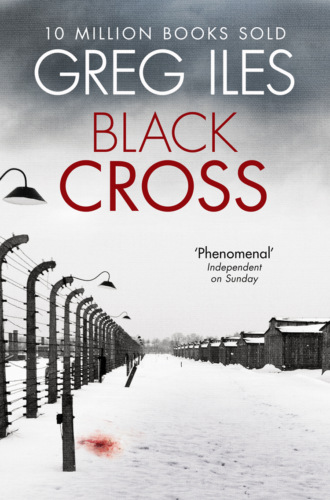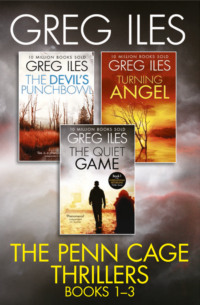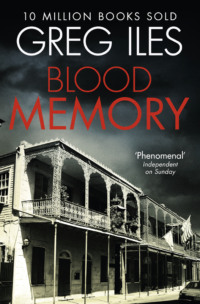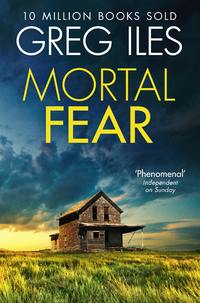
Полная версия
Black Cross

GREG ILES
Black Cross

Dedication
FOR
Betty Thornhill Iles
AND
Every man and woman who sacrificed their lives in the Allied cause.
There is a mysterious cycle in human events.
To some generations much is given.
Of other generations much is expected.
This generation has a rendezvous with destiny.
—Franklin Delano Roosevelt
Table of Contents
Cover
Title Page
Dedication
Epigraph
Chapter One
Chapter Two
Chapter Three
Chapter Four
Chapter Five
Chapter Six
Chapter Seven
Chapter Eight
Chapter Nine
Chapter Ten
Chapter Eleven
Chapter Twelve
Chapter Thirteen
Chapter Fourteen
Chapter Fifteen
Chapter Sixteen
Chapter Seventeen
Chapter Eighteen
Chapter Nineteen
Chapter Twenty
Chapter Twenty-One
Chapter Twenty-Two
Chapter Twenty-Three
Chapter Twenty-Four
Chapter Twenty-Five
Chapter Twenty-Six
Chapter Twenty-Seven
Chapter Twenty-Eight
Chapter Twenty-Nine
Chapter Thirty
Chapter Thirty-One
Chapter Thirty-Two
Chapter Thirty-Three
Chapter Thirty-Four
Chapter Thirty-Five
Chapter Thirty-Six
Chapter Thirty-Seven
Chapter Thirty-Eight
Chapter Thirty-Nine
Chapter Forty
Chapter Forty-One
Chapter Forty-Two
Chapter Forty-Three
Chapter Forty-Four
Chapter Forty-Five
Chapter Forty-Six
Chapter Forty-Seven
Chapter Forty-Eight
Chapter Forty-Nine
Epilogue
Afterword
Acknowledgments
About the Author
Books by Greg Iles
Copyright
About the Publisher
ONE
It’s odd how death often marks a beginning rather than an end. We know someone for ten years, twenty years, longer. We see them in the course of daily life. We speak, laugh, exchange harsh words; we think we have some notion of who they are.
And then they die.
In death, the fluid impressions formed over a lifetime begin to assume definite shape. The picture comes into focus. New facts emerge. Safes are opened, wills read. With finality, and with distance, we often discover that the people we thought we knew were actually quite different than we imagined. And the closer we were to them, the more shocking this surprise is.
So it was with my grandfather. He died violently, and quite publicly, in circumstances so extraordinary that they got thirty seconds of airtime on the national evening news. It happened last Tuesday, in a MedStar helicopter ambulance en route from Fairplay, Georgia—the small town in which I was born and raised—to Emory University Hospital in Atlanta, where I work as an emergency physician. While making his rounds at Fairplay’s local hospital, my grandfather collapsed at a nurses’ station. Fighting to ignore the terrible pain in his lower back, he had a nurse take his blood pressure. When he heard the figures, he correctly diagnosed a leaking abdominal aortic aneurysm and realized that without immediate surgery he would die.
With two nurses supporting him, he spoke on a telephone just long enough to summon the MedStar from Atlanta, forty miles away. My grandmother insisted on remaining by his side in the chopper, and the pilot reluctantly agreed. They don’t usually allow that, but damn near everybody in the Georgia medical community knew or knew of my grandfather—a quiet but eminently respected lung specialist. Besides, my grandmother wasn’t the kind of woman that men talked back to. Ever.
The MedStar crashed twenty minutes later on a quiet street in the suburbs of Atlanta. That was four days ago, and as yet no one has determined the cause of the crash. Just one of those freak things, I guess. Pilot error, they like to call it. I don’t really care whose fault it was. I’m not looking to sue. We’re not—or weren’t—that kind of family.
My grandparents’ deaths hit me especially hard, because they raised me from the age of ten. My parents died in a car crash in 1970. I’ve seen more than my share of tragedy, I suppose. I still do. It sweeps through my emergency room every day and night, trailing blood and cocaine and whiskey-breath and burnt skin and dead kids. Such is life. The reason I’m writing this down is because of what happened at the burial—or rather, who I met at the burial. Because it was there, in a place of death, that my grandfather’s secret life revealed itself at last.
The cemetery crowd—a large one for our town, and predominantly Protestant—had already drifted back toward the long line of sedate Lincolns and brighter Japanese imports. I was standing at the green edge of the graves, two side-by-side holes smelling of freshly turned earth. A pair of gravediggers waited to cover the gleaming silver caskets. They seemed in no particular hurry; both had been patients of my grandfather at one time or another. One—a wiry fellow named Crenshaw—had even been brought into the world by him, or so he said.
“They don’t make docs like your grandpa anymore, Mark,” he declared. “Or Doctor, I should say,” he added, smiling. “I can’t quite get used to that title. No offense, but I still remember catching you out here at midnight with that Clark girl.”
I smiled back. That was a good memory. I can’t quite get used to the title either, as a matter of fact. Doctor McConnell. I know I am a doctor—a damn good one—but when I stand, or stood, beside my grandfather, I always felt more like an apprentice, a bright but inexperienced student in the shadow of a master. That was what I was thinking when someone tugged at my jacket sleeve from behind.
“Afternoon, Rabbi,” said the gravedigger, nodding past me.
“Shalom, Mr. Crenshaw,” said a deep, much-traveled voice.
I turned. Behind me stooped an avuncular old man with snow-white hair and a yarmulke. His twinkling eyes settled on me and gave me a thorough going-over. “The spitting image,” he said quietly. “Though you’re a little heavier-boned than Mac was.”
“My grandmother’s genes,” I said, a little embarrassed to be at a disadvantage.
“Quite right,” said the old man. “Quite right. And a beautiful woman she was, too.”
Suddenly I placed him. “Rabbi Leibovitz, isn’t it?”
The old man smiled. “You have a good memory, Doctor. It’s been a long time since you’ve seen me up close.”
The old man’s voice had a low, musical quality to it, as if all its edges had been worn away by years of soothing, reasonable speech. I nodded again. The gravediggers shuffled their feet.
“Well,” I said, “I guess it’s about time—”
“I’ll take that shovel,” Rabbi Leibovitz told Crenshaw.
“But Rabbi, you shouldn’t be doing heavy work.”
The rabbi took the shovel from the amazed gravedigger and spaded it into the soft pile of dirt. “This is work for a man’s friends and family,” he said. “Doctor?” He looked up at me.
I took the other shovel from the second man and followed his example.
“Afternoon, Mark,” muttered Crenshaw, a little put out. He and his partner shambled off toward a battered pickup that waited at a discreet distance.
I shoveled earth steadily into my grandmother’s grave while Rabbi Leibovitz worked on the other. It was hot—Georgia summer hot—and soon I was pouring sweat. As the backfill rose toward my feet, I was a little surprised to find that the shoveling felt better than anything I had done since I first heard the news of my grandparents’ deaths, and far better than anything anyone had said to console me. When I checked the old man’s progress, I was surprised to find him only a little behind me in his work. I went back to mine with a will.
When I finished filling my grandmother’s grave, I walked around to help Rabbi Leibovitz. Together we finished filling my grandfather’s in a couple of minutes. The rabbi laid his shovel on the ground behind him, then turned back to the grave and began praying quietly. I stood holding my shovel in silence until he had finished. Then, as if by mutual consent, we started walking to the narrow asphalt lane where I had parked my black Saab.
I saw no other cars nearby. The cemetery was a good mile and a half from the center of town. “Did you walk all the way out here, Rabbi?” I asked.
“I caught a ride from a good Christian,” he said. “I was hoping to ride back with you.”
The request caught me off guard, but I said, “Sure, glad to do it.”
I opened the passenger door for him, then went around and got behind the wheel. The Swedish-built engine revved smoothly. “Where to?” I asked. “You still live across from the synagogue?”
“Yes. But I thought we might visit your grandparents’ house. Are you staying there while you’re in town?”
“Yes,” I admitted. “Yes, I am.” I looked at him curiously. Then I felt a familiar sense of recognition. I had seen these situations before. Some people don’t feel comfortable confronting serious medical symptoms in a physician’s office. “Is there something you need to tell me, Rabbi?” I asked slowly. “Are you in need of medical attention?”
“No, no. I’m quite well for my age, thank God. But there is something I’d like to talk to you about, Mark. Something I think your grandfather meant to discuss with you … eventually. But somehow I don’t think he ever made the time.”
“What are you talking about?”
“About what your grandfather did in the war, Mark. Did he ever talk to you about that?”
I felt myself flush a little. “No. He never got past ‘I did my duty when it was required.’”
“That sounds like Mac.”
“He never talked to my grandmother about it either,” I confided, surprising myself. “She told me that, and … it hurt her. It was kind of like a hole in our lives. Small, maybe, but there all the same. A dark place, you know?”
Rabbi Leibovitz nodded. “A very dark place, Mark. And I think it’s about time someone shed a little light on it for you.”
Fifteen minutes later we were standing in the study of my grandparents’ house. Three generations of doctors had grown up in this rambling country clapboard. We were looking down at the steel firesafe where my grandfather had always kept his personal papers.
“Do you know the combination?” the rabbi asked.
I shook my head. He reached into his back pocket, withdrew his wallet, and dug around inside until he found what he was looking for—a small white card of introduction, one of my grandfather’s. He read some numbers off the back, then looked at me expectantly.
“Listen, Rabbi,” I said, beginning to grow uncomfortable, “I’m not exactly sure why we’re here. I mean, I know you and my grandfather were acquaintances, but I never knew you were close. Frankly, I don’t see how anything in that safe could be any business of yours.” I paused. “Unless … he left the synagogue a bequest in his will. Is that it?”
Leibovitz chuckled. “You’re a suspicious man, Mark, just like your grandfather. No, this has nothing to do with money. I doubt if Mac had much left, to tell you the truth. Except for the insurance, which was only around fifty-thousand, I think. He gave most of his money away.”
I shot him a sidelong glance. “How do you know all that?”
“Your grandfather and I were more than acquaintances, Mark. We were fast friends. I know about his money because he gave a lot of it to the synagogue. Once you made it through medical school, he figured you could take care of yourself, and your grandmother too, if he happened to die first. He owned this house, of course. You’ll get that. As far as the money he gave me, I was to use it to help persecuted Jews who were trying to reach Israel.” Leibovitz turned his callused palms upward. “This all goes back to the war, Mark. What Mac did during the war. If you open that safe for me, everything will become much clearer.”
That reasonable, forthright voice was hard to refuse. “All right,” I agreed, knowing I was being manipulated, but strangely unable to resist. “Read the combination again.”
As Leibovitz read, I worked the dial on the safe until I heard a click, then pulled open the heavy door. The first thing I saw was a stack of papers. Just what I had expected. They looked like legal documents—titles to the two family cars, the house, an ancient mortgage.
“Do you see a box?” the rabbi asked. “It would be nearly flat, and not too large.”
Carefully I dug through the papers. Sure enough, near the bottom of the stack my fingers touched a flat wooden box. I removed it from the safe. It was made of plain pine, about six inches square. I had never seen it before.
“Open it,” Leibovitz commanded.
I looked over my shoulder at him, then turned back and lifted the lid off the box. The glint of polished metal flickered in the light.
“What is that?” I asked.
“The Victoria Cross. The most coveted decoration in the British Empire. Have you heard of it?”
“The Victoria Cross … Isn’t that what Michael Caine won in Zulu?”
Leibovitz shook his head sadly. “Television,” he muttered. “Yes, the Victoria Cross was awarded to a handful of Englishmen who repulsed an overwhelming Zulu army at Rorke’s Drift in South Africa.”
I lifted the cross gingerly and examined it in the light. It was bronze, and hung from a crimson ribbon. The center of the cross bore a lion standing upon a crown. Engraved on a scroll beneath the crown were the words: FOR VALOUR.
Rabbi Leibovitz spoke as if addressing a small congregation. “The list of recipients of the V.C. constitutes the most revered roll in English military history, Mark. As far as the public knows, only thirteen hundred and fifty have been awarded since the decoration was instituted by Queen Victoria in 1856. But there is another list—a much smaller list—that is known to no one but the monarch and the prime minister. It is the Secret List, and upon it are inscribed the names of those who have performed unparalleled acts of valor and devotion in the face of the enemy, but of such a sensitive nature that they can never be revealed.” He took a deep breath, then said: “Your grandfather’s name is on that list, Mark.”
My head snapped up in astonishment. “You must be joking. He never mentioned anything like that to me.”
The old rabbi smiled patiently. “That was the charge that came with the award. The decoration can never be worn in public. I suppose the secret cross was given so that in the dark of night, long after glory had passed, men like your grandfather would have something to remind them that their … sacrifices were appreciated.” Leibovitz looked thoughtful. “Still, it takes a special kind of man to hide that kind of glory.”
“Granddad was no egomaniac,” I conceded, “but he wasn’t especially modest either. He didn’t hide honors he deserved.”
Leibovitz sighed sadly. “Mac deserved this honor, but he wasn’t proud of what he had done to deserve it. He began the war as a conscientious objector, you know.”
“I didn’t know that.”
“Mark, long ago your grandfather sought me out to discuss something that troubled him deeply. He’d spoken to his Christian pastor about it, but said the fellow hadn’t really understood what he was talking about. The pastor told Mac he was a hero, that he had no reason to be ashamed of what he’d done. Mac struggled along on his own for a while, then finally came to me.”
“Why you?”
“Because I’m a Jew. He thought perhaps I could give him special insight into his problem, that I might be able to help him to unburden his soul.”
I swallowed. “Did you?”
“I tried my best. I truly did. Over a period of years, in fact. And he was grateful for the effort. But I never really succeeded. Your grandfather carried his burden with him to the grave.”
“Well, damn it, you’ve got to tell me now. What did he do that was so terrible? And when did he do it? He told me that he spent the war in England.”
Leibovitz’s eyes settled on some neutral point in space. “He spent most of the war in England, that’s true—doing research at Oxford. But for two short weeks, your grandfather traveled quite a bit. And his travels ultimately led him to a place that must have been very close to hell on earth.”
“Where was that?”
Leibovitz’s face hardened. “A place called Totenhausen, on the Recknitz River in northern Germany. As to when Mac was there, if you turn over the cross it will tell you.”
I turned the cross over. Engraved on its back were the words:
Mark Cameron McConnell, M.D.
15 February 1944
“That’s the date that the act of valor took place,” Leibovitz murmured. “Fifty years ago, your grandfather did something so strategically important, so singularly heroic that he was awarded an honor only one other non-British subject has ever received. That other recipient was also an American.”
“Who was it?”
The rabbi straightened-up with difficulty, his spine stiff as a ramrod. “The Unknown Soldier.”
I felt a lump in my throat. “I can’t believe this,” I said hoarsely. “This is the most extraordinary thing I’ve ever heard. Or seen,” I added, holding up the ribbon and cross. It seemed somehow heavier in my hands.
“You’re about to see something still more extraordinary,” Leibovitz said. “Something unique.”
I swallowed in anticipation.
“Look under the padding in the box. It should still be there.”
I handed the cross to Rabbi Leibovitz, then gingerly lifted the linen cloth that lined the bottom of the pine box. Beneath it I found a frayed swatch of woolen cloth, a Scottish tartan pattern. I looked up questioningly.
“Keep going,” Leibovitz said.
Beneath the tartan I found a photograph. It was black-and-white, with contrasts so stark it looked like one of the old Dust Bowl photographs from Life magazine. It showed a young woman from the waist up. She wore a simple cotton dress, her slender body posed rather formally against a background of dark wooden planks. Her shoulder-length hair was blonde and straight, and seemed to glow against the unfinished wood. Her face, though worn by care lines around the mouth, was set off by eyes as dark as the wood behind her. I guessed her age at thirty.
“Who is this?” I asked. “She’s … I don’t know. Not beautiful exactly, but … alive. Is it my grandmother? When she was younger, I mean?”
Rabbi Leibovitz waved his hand impatiently. “All in good time. Look beneath the photograph.”
I did. A meticulously folded piece of notepaper lay there, wrinkled and yellowed with age. I lifted it out and started to unfold it.
“Careful,” he warned.
“Is this the citation for the award?” I asked, working delicately at the paper.
“Something else altogether.”
I had it open now. The handwritten blue letters had almost completely faded, as if the note had been put through a washing machine by mistake, but the few words were still legible. I read them with a strange sense of puzzlement.
On my head be these deaths.
W
“I can barely read it. What does it mean? Who is ‘W’?”
“You can barely read the writing, Mark, because it was nearly washed away by the freezing waters of the Recknitz River in 1944. What the note means can only be explained by telling you a rather involved and shocking story. And ‘W’—as the author of that note so cryptically described himself—was Winston Churchill.”
“Churchill!”
“Yes.” The old rabbi smiled mischievously. “And thereby hangs a tale.”
“My God,” I said.
“Would you have any brandy about?” asked Leibovitz.
I went to fetch a bottle.
“I lay it all at Churchill’s door.”
The old rabbi had ensconced himself in a leather wing chair with a crocheted comforter around his knees and the brandy glass in his hand. “You know, of course, that Mac first went to England as a Rhodes scholar. That was 1930, the year after the Crash. He stayed two years, then was asked to stay a third and matriculate. Quite an honor. When he graduated and returned to the U.S., I’m sure he thought his ‘English period’ was finished. But it wasn’t.
“He graduated medical school in thirty-eight, somehow squeezing in a masters in chemical engineering during his internship. By then it was 1940. He entered general practice with a friend of his father’s, but he’d hardly settled in when a phone call came from Oxford. His old tutor told him that one of Churchill’s scientific advisers had been impressed by some monographs he’d done on chemical warfare in World War One. They wanted him to join a British team working on poison gases. America wasn’t in the war yet, but Mac understood what was at stake. England was hanging by a thread.”
“I do remember that much,” I said. “He agreed to go on the condition that he would only work in a defensive capacity. Right?”
“Yes. Rather naively, if I may say so. Anyway, he took your grandmother with him to England, just in time for the Battle of Britain. It took some doing, but he talked Susan into going back to the States. Hitler never did invade England, but by then it was too late. They were separated for the duration.
“Fifty years,” Leibovitz said softly. He paused as though he had lost his train of thought. “I suppose that seems an age to you, but try to picture the time. Dead of winter, January, 1944. The whole world—including the Germans—knew the Allies would invade Europe in the spring. The only question was where the blow would fall. Eisenhower had just been named Supreme Commander of OVERLORD. Churchill—”
“Excuse me, Rabbi,” I interrupted. “No disrespect intended, but I get the feeling you’re giving me the long version of this story.”
He smiled with a forbearance learned at the sides of impatient children. “You have somewhere to go?”
“No. But I’m curious about my grandfather, not Churchill and Eisenhower.”
“Mark, if I simply told you the end of this story, you would not believe me. I mean that. You cannot absorb what I am going to say unless you know what led to it. Do you understand?”
I nodded, trying to mask my impatience.
“No,” Leibovitz said forcefully. “You don’t. The worst thing you have ever seen in your life, all the worst things put together—child abuse, rape, even murder—these are as nothing compared to what I am about to tell you. It is a tale of cruelty beyond imagining, of men and women whose heroism has never been equaled.” He raised a crooked finger and his voice went very low. “After hearing this story, your life will never be the same.”
“That’s a lot of buildup, Rabbi.”
He took a gulp of brandy. “I have no children, Doctor. Do you know why?”
“Well … I assume you never wanted any. Or that you or your wife were sterile.”
“I am sterile,” Leibovitz confirmed. “When I was sixteen, I was invited by some German doctors to sit in a booth and fill out a form that would take fifteen minutes to complete. During those fifteen minutes, high-intensity X-rays were passed through my testicles from three sides. Two weeks later, a Jewish surgeon and his wife saved my life by castrating me in their kitchen.”







